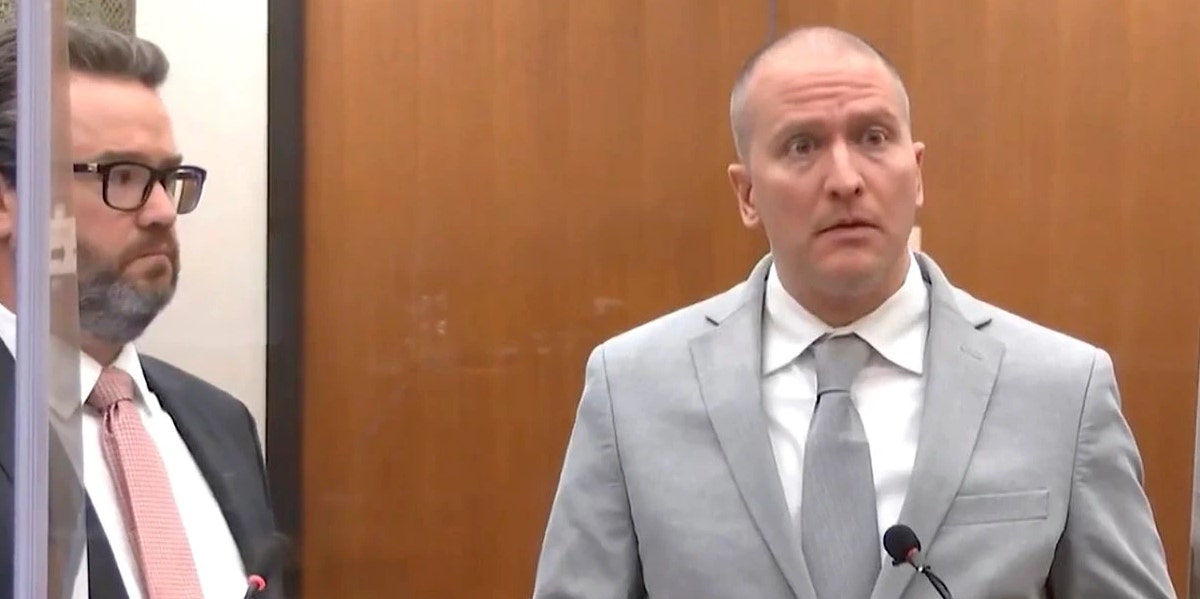Derek Chauvin Sentenced To 22.5 Years — As Many Ask When US Courts Will Stop Going Easy On Killer Cops
Chauvin's sentence is 26 years less than the average murder sentence.
 YouTube
YouTube Derek Chauvin has been sentenced to 22.5 years for the murder of George Floyd in a high-profile case that has cast doubt on an entire law enforcement system.
The sentencing follows a welcomed guilty verdict in April 2021 for the 2020 murder.
Minneapolis police Chauvin officer has become a symbol for a dark history of police brutality against Black people in the US.
His sentence takes into account his lack of criminal record but, given the betrayal of his duty to serve and protect and the clear lack of regard shown for Floyd’s life, many may have expected a harsher sentence for Chauvin.
Derek Chauvin is one of few police officers to be convicted of, and spend time in prison for, murder.
Chauvin is part of a small number of law enforcement officers who have been successfully convicted for their involvement in on-duties killings in recent years.
Since 2005, 140 police officers have been arrested on murder or manslaughter charges after on-duty killings. Yet, only about a third were convicted — the majority of which were not murder convictions.
Chauvin will become only the 10th police officer to be sentenced to a prison term for his role in an on-duty murder.
The figures are based on cases that are reported to the media and may not even cover the extent of the leniency officers face.
Police who kill face lenient sentences, if any.
Even those convicted face much more moderate sentencing than the general population.
The average sentence for police officers convicted of an on-duty murder is 16.4 years.
Other data that includes all nonfederal law enforcement officers — such as police officers, deputy sheriffs and state troopers — estimates the average sentence to be 21.7 years.
This is drastically less than the murder sentences faced by the general population which was 48.8 years in 2018, according to recently released data.
Chauvin’s sentence is a fleeting glimmer of justice in a country that so often forgives rogue police officers for their crimes.
Yet, the jury is still out on whether his prison term will be the catalyst for harsher accountability for killer cops.
Chauvin will be the 10th officer to face a prison term for on-duty murder and the 11th is likely to follow shortly behind when William Darby, a Huntsville, Alabama, police officer faces sentencing in August for the murder of a suicidal man, Jeffrey Parker, in 2018.
A new wave of police accountability will be welcomed by those who fought for Chauvin’s conviction both in and outside the courtroom.
Chauvin’s sentence could reshape policing in the US.
Chauvin’s case penetrated the historical blue wall of silence as police chiefs raged against his excessive use of force.
The case has made it possible for juries and the general population to second-guess the actions of on-duty police officers.
As rare as it is for an officer like Chauvin to be sentenced to prison, it is even more so for an officer to commit a crime in the way he did.
Chauvin’s crime was filmed and documented from several angles. It ignited international uproar and refueled an ongoing civil rights movement. It cast blame on the entire justice system and their attitude toward Black people.
Floyd’s murder was a result of over nine minutes of excessive force. It was not a split-second decision like those made by most of Chauvin’s predecessors.
Seven of the nine officers sentenced to prison before Chauvin shot their victims.
The high-profile nature of the case and the clear video evidence made it impossible for Chauvin’s fellow police officers to defend or cover up his actions.
It’s difficult to estimate whether or not Chauvin’s conviction and sentencing will set a precedent for police officers whose crimes are not filmed.
Equally, the pushback from law enforcement reflects a desire to paint Chauvin’s actions as an outlier. Doing so relinquishes the responsibility of the police force and denies the need for reform.
Chauvin’s somewhat moderate sentence, though more lenient than the average murder conviction, might at the very least cause law enforcement to look at themselves to find where the remainder of the blame for Floyd’s death should lie.
Alice Kelly is a writer living in Brooklyn, New York. Catch her covering all things social justice, news, and entertainment. Keep up with her Twitter for more.
